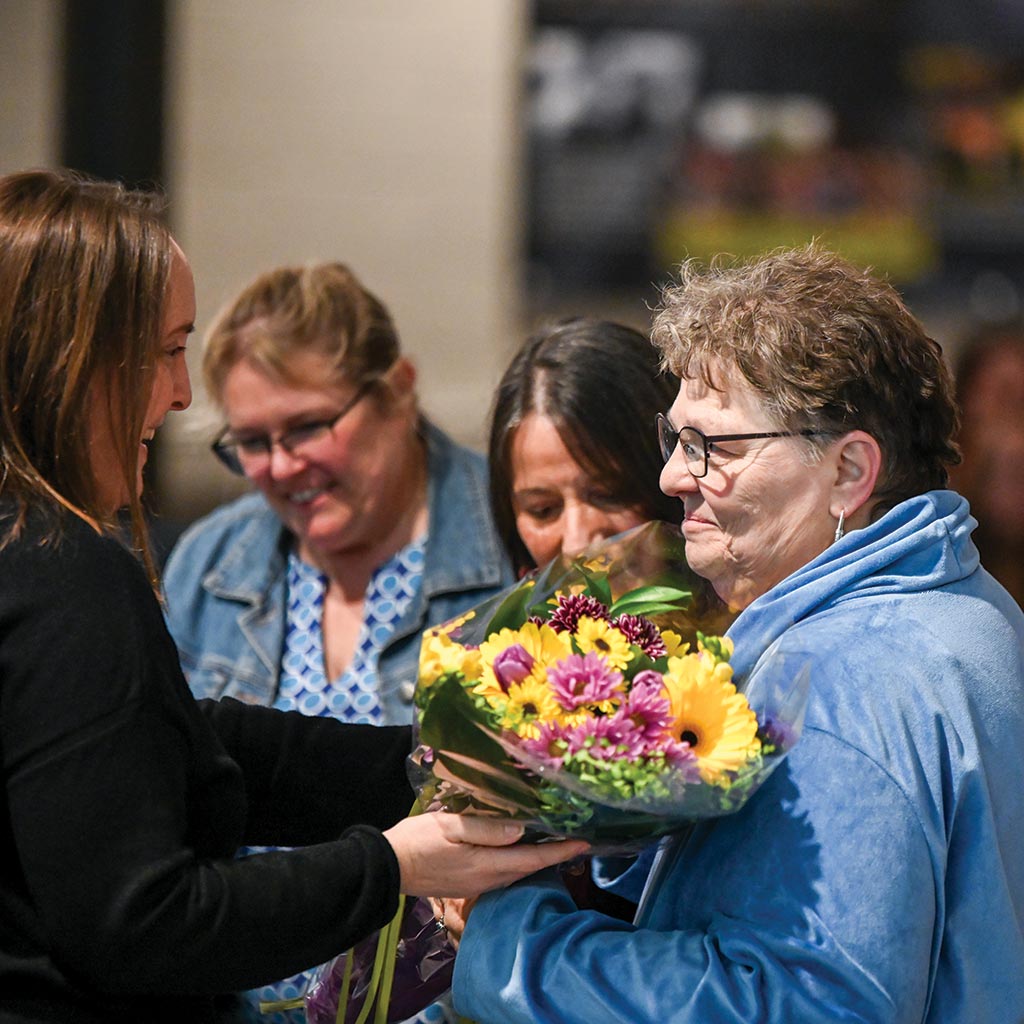“Tacitus said that eloquence burns bright and we will be illuminated. May Hermes, the god and protector of ancient oratory, guide the finalists to eloquence.”
Invoking the blessing of the ancients, Donna Weimer, Thornbury Professor of Communication, surveyed the audience gathered in Alumni Hall, hands resting lightly on either side of the iconic Juniata College podium, as she delivered her perennial benediction to open the 113th Bailey Oratorical — just as she has for the past 33 years.
“The power of the Bailey goes beyond the thrill of the audience in hearing the speeches and beyond the ways in which the experience hones the poise, eloquence, and skills of the speakers,” said Provost Lauren Bowen. “Collectively, the speeches shape our collective narrative about who we are as a community and the mission we share, and the values to which we aspire.”
The Bailey, as it is known colloquially, is more than public speaking, a fear many hold above death. The oldest of the College’s academic traditions, the competition celebrates the art of communication. This year, with the approach of Weimer’s retirement, it was also a celebration of the woman who has been the heart of the event since she joined the faculty in 1990.
“At the turn of the last century, Juniata was quite famous for its oratorical events. We had one of the finest debate teams in the country. We debated against big schools,” Weimer explained. “In Charles Ellis’s [1898 graduate and Juniata College’s fifth president] history, he mentions oratorical contests as far back as 1900, but the Bailey Oratorical was officially founded in 1910 to honor John Bailey, a well-known Huntingdon County judge and prize money was attached.”
Founded by attorney and later Judge Thomas Bailey, the elder justice’s son, and his wife, Letitia (Fisher) Bailey, and later financially supported by their son-in-law, Sedgley Thornbury, and his sister, Destal Thornbury. In the early years, the Bailey was a public event, but by 1953 it was limited in scope and audience, virtually unknown outside the Juniata campus community.
President Robert Neff entrusted Weimer with revitalizing the tradition soon after she joined the faculty as an English professor and cornerstone of the College’s emerging communication department in 1990.
“Quite simply, the Bailey as we know it today is because of Dr. Weimer’s extraordinary effort and vision,” said President James A. Troha. “Her love and passion for the student voice have enabled this tradition to prosper, and all of us at Juniata owe Dr. Weimer a huge debt of gratitude. While we will certainly miss Donna at Juniata, her legacy will be with us forever.”
Through the years, Juniata’s communication department grew to include Grace Fala, Lynn Cockett, Sarah Worley ’00, and Jared LaGroue, all of whom are instrumental in preparing and encouraging students to embrace the challenge that is the Bailey.
With the crowd growing each year exponentially, the Bailey Oratorical moved locations across campus before reaching its current setting in Alumni Hall. When Worley, who would later become associate professor of communication, stood behind the podium as a student, the Bailey was held in the former faculty lounge adjacent to Baker Refectory, then in Ellis Ballroom.
“I remember going to Donna’s and Grace’s offices as we prepared. The two always worked some magic in the final products,” said Worley, adding she could never have imagined joining them as colleagues. “It was the honor of a lifetime. I had to pinch myself to realize how lucky I was to have the connection and relationship so many of us appreciated as students.”
Worley returned to campus after graduation to serve as a judge for the Bailey before joining Juniata’s faculty and helping prepare students for competition herself.
“Interest in the Bailey was stalwart. We had a small group of students committed to communication, but we made it clear from the beginning that it wasn’t just about communication,” stated Weimer. “It’s a most eclectic band of students who have participated and won.”
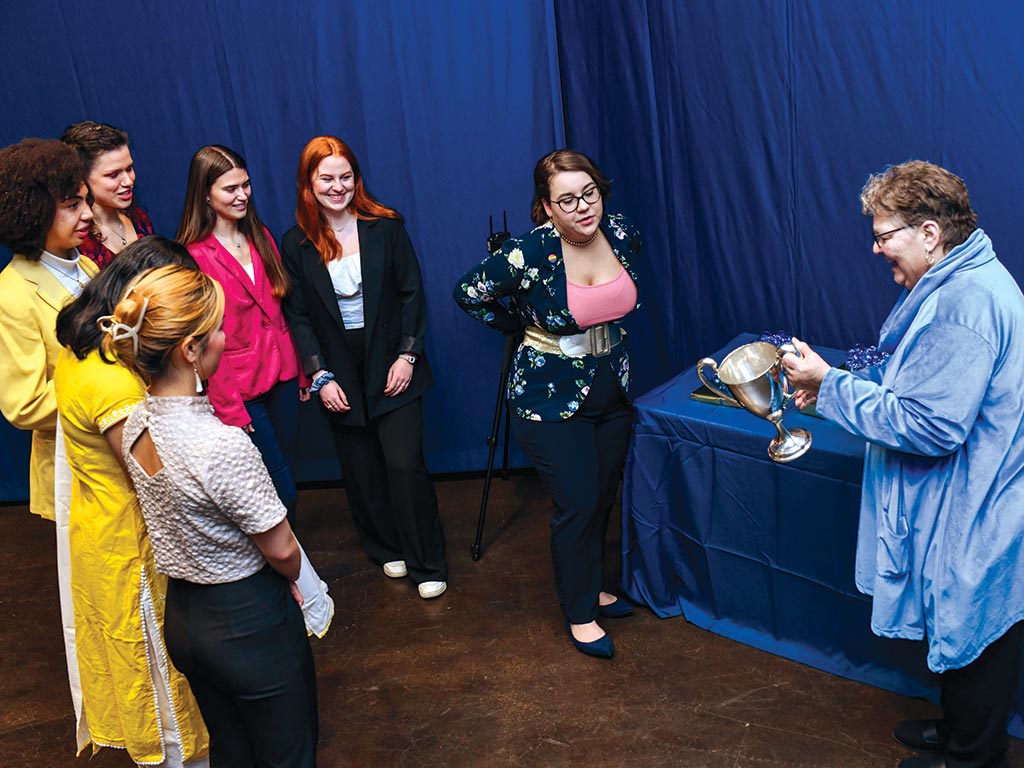
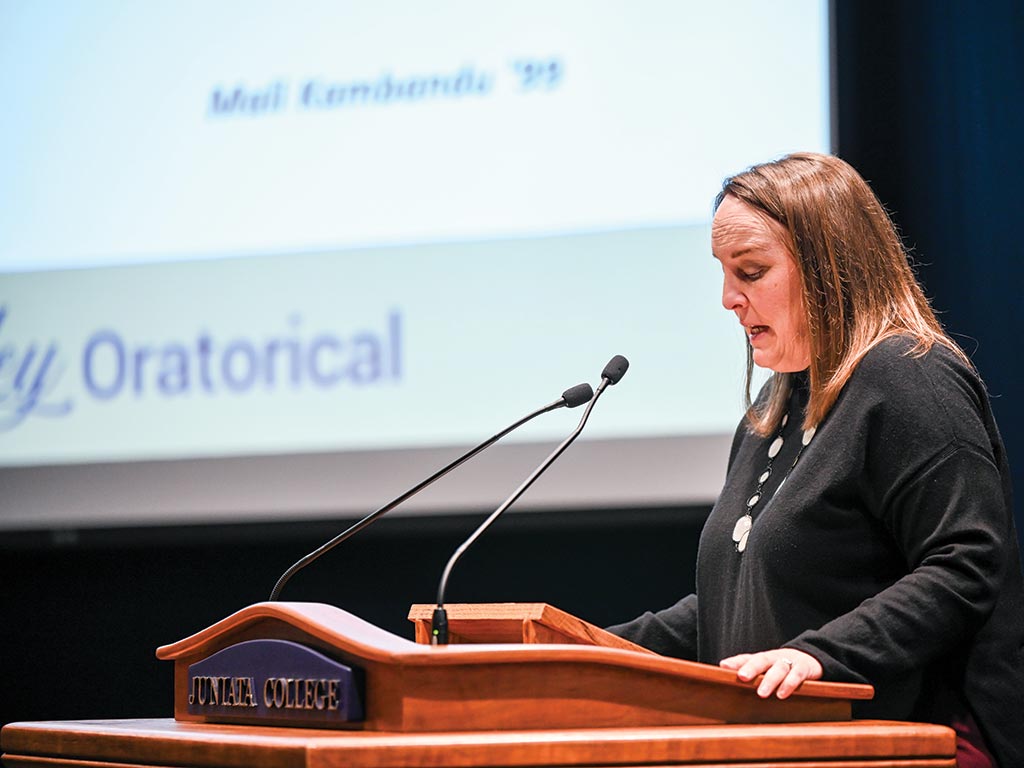
Parisha Shah ’01 was studying molecular biology and health communication when she placed third in the Bailey in both 1998 and 2001. What she remembers most about the experience has nothing to do with the end result and everything to do with what she learned.
“Therein lies the brilliance of Donna Weimer. She is a master at seeing and bringing out the best in her students, helping her see it in themselves, and teaching them the wisest lessons in the process,” Shah emphasized. “Her wisdom is a gift that has yet to stop giving.”
Topics for the Bailey are as diverse as the students who compete each year, often drawing on current events, each designed to draw out a depth of understanding and a breadth of ability to communicate the subject. With wisdom and empathy, Weimer encourages orators to make their speeches personal and meaningful.
“The fall of 2001 impacted so many lives and changed our country. For me, it was the year I also lost my mom to cancer,” recalled Leigh Ann Suhrie Wilson ’02, adding the prompt challenged speakers to reexamine the assumptions, actions, or consequences of the 9/11 tragedy. “I brought those two impactful moments together by focusing on blood donations. My mom needed transfusions in her last few months of life. The outpouring of donations was great when there was an urgent need, and then donations returned to low levels despite the ongoing need for patients like my mom.”
Witnessing the transformation of competitors from cowed to confident “gives you chills,” Weimer said. “People with tiny voices in class, if they feel passionate about a topic, will come in and speak from the heart. Having a good message is not good enough, having a message that is crafted so your audience can hear it and respond to it that’s when you cross over into eloquence.” Judges for the Bailey Oratorical have included legislators, college presidents, scholars, and outstanding alumni.
“We tried to elevate the perceptions of how important this was to have our students recognized as extraordinary speakers,” Weimer shared. “Now, as we have evolved, I have started to focus on how extraordinary our alums are — they are extraordinary humans doing extraordinary work on the planet. So, we bring them back so our students can see how successful our alumni are.
Jeffrey Bellomo ’00, along with Shah, and Suzy Atkins ’93, returned to campus to serve as judges for the 113th Bailey Oratorical and to honor the woman they value as their mentor and friend.
“I didn’t compete my first two years because I was overwhelmed and scared. My senior year, I decided to take a run at it,” said Bellomo, who took first place that year and now is an attorney specializing in elder law. “I love speaking in public. I do it for a living now and wouldn’t be where I am today without the Bailey experience and the Juniata College communication department.”
Bellomo’s reverence for the Bailey is shared by many for whom the tradition marked a substantive change in their sense of accomplishment. Some were first-generation college students or those from families who struggled financially, determined not to reach too far beyond self-limited capabilities.
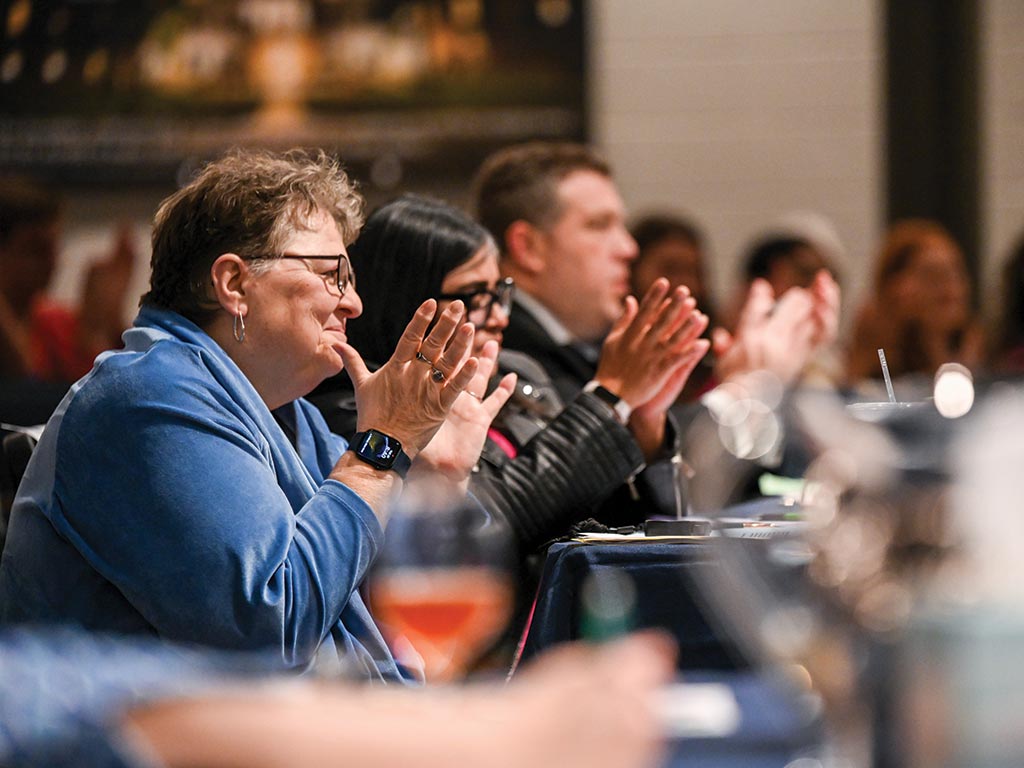
“At the Bailey, they had this moment where they saw themselves differently, and it changed their life forever,” Weimer observed. “They found a new place in their hearts for the liberal arts and realized, ‘This is also me. This is part of who I am.’”
The prospect of public speaking was incredibly daunting for Magda Sarnowska Patitsas ’07 as she was concerned her accent would be an obstacle.
“People with tiny voices in class, if they feel passionate about a topic, will come in and speak from the heart. Having a good message is not good enough, having a message that is crafted so your audience can hear it and respond to it that’s when you cross over into eloquence.”
Donna Weimer
“This tradition challenges students to think before they speak and to speak with intention and purpose. It’s one thing to debate pointlessly, it’s another to deliver a thought-out and purposeful message. It’s as much an art as science,” Patitsas commented. “I gained confidence in my ability to effectively communicate with an audience despite, or maybe even because of, my foreign accent and perspective.”
Worley will step into Weimer’s role as the organizer of the Oratorical, continuing the tradition, asking new questions, and focusing on new possibilities.
“This is something I care about deeply and passionately. I see what a transformative opportunity it is for students and our community year after year. It reflects our deeply held values and empowers students with space and a forum for their voice,” Worley reflected. “Words matter. Ideas matter. We can disagree in civil ways and hear others’ ideas. It’s more significant in the 21st century than ever.”
The indelible impact on the lives of all involved, those who have taken the time to coach would-be speakers, soothed frazzled nerves, encouraged, judged, organized, or watched, is apparent.
“The Bailey is there to remind all of us that Juniata is a working liberal arts college. Students are experiencing ideas and people and thinking about how to talk to them,” Weimer said. “It crystallizes the work I do with students. It’s the moment where an attitude, a skill, and an idea come to fruition in our students’ hearts.”
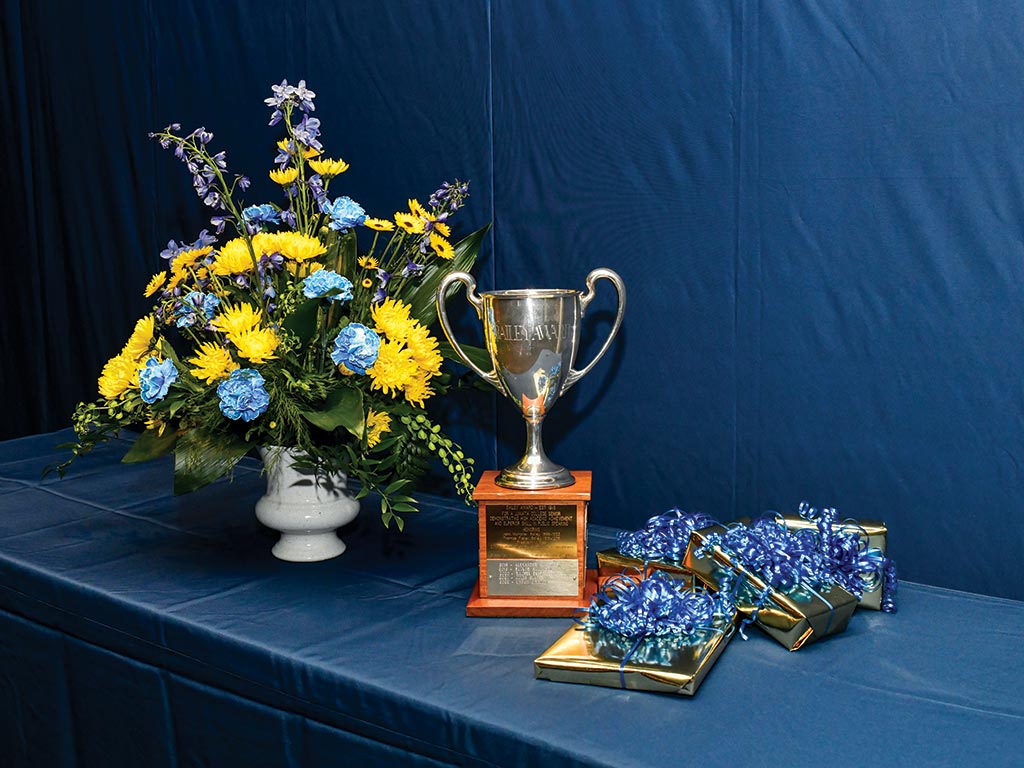
The Donna S. Weimer Award
To honor Donna and her many contributions to Juniata, we are establishing the Donna
S. Weimer Award, which will be given annually to a Juniata student who makes creative
and positive contributions to the field of communication.
If you are interested in honoring Dr. Weimer through a contribution to this award
contact Greg Bayles, associate director of major gifts, at (814) 641-3442 or baylesg@juniata.edu. You can also make a gift online at www.juniata.edu/give . Please select “other designation” and note Donna S. Weimer Award in the comments
section.

